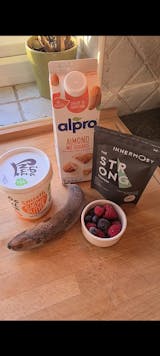We're constantly being filled with information from various platforms about foods that are good and bad for us. The term anti-inflammatory is thrown at us all, but what does it actually mean? Anti-inflammatory foods like The Recover Capsules are popular in our day-to-day life to help reduce inflammation. But why are these foods good for you? Is inflammation always bad, and what can we do to prevent it? Don’t worry we’ve got you, here’s everything you need to know about inflammation and how to reduce it.
What is inflammation?
Inflammation is the bodies process of dealing with things that may cause you harm. Like an injury, infection, or allergen for example. Derived from the Latin phrase inflamare which means heat. It’s used to describe when your body’s white blood cells, more specifically the macrophages, protect you from any damage and help to reduce any swelling. The most common type of inflammation is low-level chronic inflammation. This is the type that can cause heart disease, obesity, osteoarthritis and even cancer.
Inflammation also occurs when you body responds to unwanted substances like an excess of fat cells. This why our body produces blood clots. Inflammation helps with the build-up of cholesterol-rich plaque. Your body then picks this up as unwanted and foreign and tries to remove this plaque by flowing blood. The plaque then mingles with your blood and forms a clot that blocks your blood flow. These blood clots are the causes for most strokes and heart attacks.
Is inflammation good?
Inflammation causes pain, we need that pain in to alert our bodies that there is something wrong. The other symptoms inflammation causes, the swelling, heat and redness are also especially important. They allow the immune system track and fight what’s going on. The increased blood flow brings those immune cells to the affected area to come into action. So, inflammation is your bodies healing process. Its crucial for the preservation of our health.
That being said, sometimes our body’s response is so strong that is causes further damage. The first cells to arrive at the affected area are neutrophils. These are white blood cells that contain factors that have enzymes and anti-bacterial proteins needed to break down any infectious organisms. The neutrophils release these factors into the inflamed area to fight off and neutralise any infectious organisms. However sometimes too many of these factors can be released, creating more damage to your body. Too much of this inflammation can become dangerous so we do need to balance it.
This is how chronic inflammation occurs, when the inflammation response reacts to damage done by previous inflammation resulting in your body getting stuck in constant alert. Over time this can negatively impact your major organs and tissues.
Common symptoms of this are:
- Body pain
- Fatigue
- Stomach complications
- Anxiety and depression
- Weight loss or gain
- Persistent infections
What can we do to balance inflammation?
There are several ways we can reduce inflammation in our body. There are medicines that help to balance inflammation, but not stop in completely. You can avoid pro-inflammatory foods and increase your intake of anti-inflammatory foods with an inflammation-fighting diet.
- Anti-inflammatory medicines such as paracetamol and ibuprofen can be effective on acute inflammation such as headaches. They help to prevent the inflammatory reaction from overshooting the affected area and reduce your pian symptoms. However, these aren’t so effective on chronic inflammation symptoms, and can cause side effects if taken long term.
- Reduce pro-inflammatory foods - By cutting down your level of pro-inflammatory foods you can reduce your risk of developing more serious conditions caused by inflammation. Pro-inflammatory foods contain high levels of trans fats, gluten, omega-6 fatty acids, dairy and additives. Your body sees these chemicals as foreign, resulting in an inflammation reaction. By reducing these foods you’re reducing your body’s inflammation reaction.
- Incorporate anti-inflammatory foods into your diet to help prevent your levels of inflammation. Foods high in omega-3 such as salmon and tuna are anti-inflammatory as well as; olive oil, tomatoes, green leafy vegetables (such as spinach that is high in magnesium). Fruits including blueberries, oranges, and cherries along with nuts including almonds and walnuts all help to prevent inflammation. These foods are all high in polyphenols and naturally occurring antioxidant that protect you from inflammation. You will be pleased to hear that coffee also contains anti-inflammatory compounds as well as the polyphenols that help protect you.
Why the Recover Capsules help against inflammation
Another great way to increase your intake of anti-inflammatory compounds is by taking certain food supplements. The Recover Capsules contain:
- Maca which is high in manganese and copper, which supports bone mineral density and has anti-inflammatory effects.
- ZMA which helps to enhance athletic performance, improves immunity and endurance as well and reducing inflammation.
- Chocamine is a cocoa extract that helps increase energy levels, which is a great benefit if you are struggling from chronic inflammation symptoms such as fatigue.
- CoQ10 has anti-inflammatory and antioxidant effects.
- Selenium helps to lower oxidative stress in your body which overall reduces inflammation.
So now you have a bit more information on what inflammation is you can pick apart the myths fed to you on social media and just take on board the real facts. There’s nothing better than building a better you, so keep up the good work and enjoy those anti-inflammatory foods!
























